The more I think about it, the more I realize the concept of “the future of the book” is limiting, if not downright problematic. At first glance, it implies that books are artifacts akin to smartphones, which annually undergo upgrades that largely (though not always) are the product of technological advances and “upgrades.” In other words, “the future of the book” gives the implication that books are mere artifacts that evolve in a vacuum with some Steve Jobs-like figure (maybe Jeff Brezos?) deciding on new features for books – even though we know the field encompasses much more than its moniker may initially suggest.
For my research paper, I’m considering examining readers of books. Books have no future if there are no readers. Along these lines, I plan on looking at reading motivation of books. This kind of motivation – especially in the form of library programs and personal practices – has a role in determining how much prominence the reading of the books has in society.
A prime example of personal practices that seem to have gained popularity in recent years are reading challenges, which encourage readers to read more and read more widely.
Also, there are many, many examples of libraries that try to encourage reading through general and specific means. Below is a picture of a small passive program to motivate patrons to read at Hart House Library:

I hope to examine how and why reading motivation programs and practices have changed over time – and to attempt to determine where they might go in the future.
